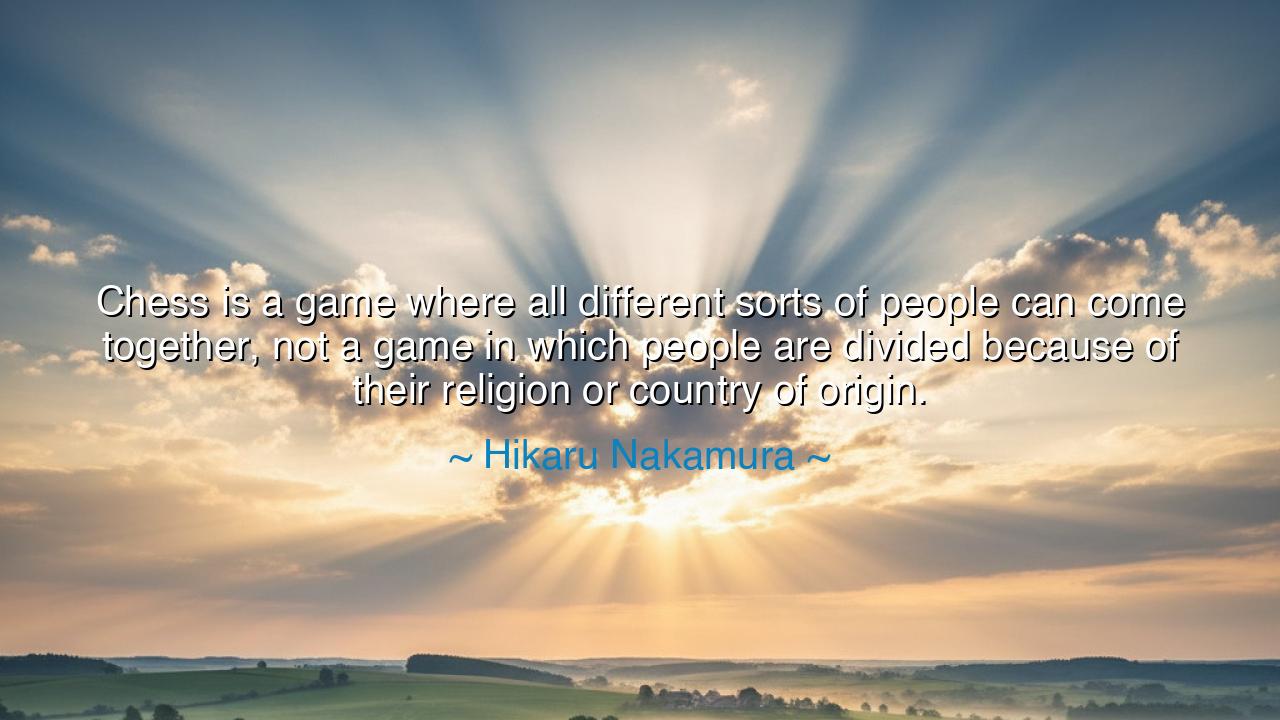
Chess is a game where all different sorts of people can come
Chess is a game where all different sorts of people can come together, not a game in which people are divided because of their religion or country of origin.






Hear, O children of wisdom, the words of Hikaru Nakamura, master of the sixty-four squares, who declared: “Chess is a game where all different sorts of people can come together, not a game in which people are divided because of their religion or country of origin.” In these words lies a truth as radiant as the sun: that the board of chess is not a battlefield of nations nor a temple of creeds, but a place where humanity itself meets in equality. For here, rank and heritage fall away, and only mind meets mind, spirit meets spirit.
The origin of this saying arises from the universal nature of chess, a game born in the ancient lands of India, carried through Persia, adopted by Arabs, embraced by Europe, and now cherished in every corner of the earth. Unlike borders, which divide, or tongues, which confuse, chess speaks one language. Its pieces, black and white, move by the same laws, no matter what flag flies above the player’s head. Thus Nakamura, who himself bears the heritage of many cultures, speaks not as a man of one nation, but as a herald of unity through play.
Consider the deeper meaning. In a world torn by strife, where religion is used to separate brother from brother and nations wage endless wars over lines in the sand, there remains a simple wooden board where all are equal. The king is no greater than his square, the pawn no lesser than his purpose. When two opponents sit across the board, their struggles mirror each other, bound by the same rules. What greater metaphor could there be for the harmony humanity must seek?
History offers a shining tale. In 1972, during the height of the Cold War, when America and the Soviet Union glared at each other with suspicion and fear, the world witnessed the match between Bobby Fischer and Boris Spassky. Though their nations were locked in ideological conflict, their duel upon the chessboard became a bridge between two worlds. It was more than a game—it was proof that even amidst division, there exists a universal stage where men can meet without guns, without bombs, only with the discipline of mind and the beauty of strategy. That was chess as Nakamura envisions it: not division, but communion.
So let us reflect: the board of chess is a symbol of the human condition. The pieces are diverse—king, queen, knight, pawn—yet all play under the same rules, all necessary for the game’s unfolding. Even so is mankind: diverse in color, creed, and culture, but one in dignity, one in destiny. To divide chess by religion or nation would be to betray its very nature. To divide humanity by the same is to betray our shared humanity.
The lesson, then, is clear. Seek out what unites rather than what divides. Cherish games, art, music, and speech that transcend borders, for in these lie the seeds of peace. Remember always that behind every flag, behind every temple, behind every tongue, beats the same human heart. If on the chessboard we can forget our divisions, then surely in life we can strive to do the same.
Practical wisdom follows. Play with those different from you, and learn to honor their skill, not their origin. Cultivate humility, for the board will teach you that even a pawn may rise to greatness. Value unity, not uniformity, for harmony is born not of sameness but of difference joined in purpose. And above all, remember Nakamura’s truth: chess is not about division but about coming together.
Thus, let the board of sixty-four squares stand as a mirror for life. Sit across from those unlike yourself, yet see in them not an enemy, but a partner in the eternal dance of mind and spirit. For as Hikaru Nakamura teaches, the true victory is not the checkmate alone, but the fellowship that arises when humanity meets as one upon the timeless field of chess.






AAdministratorAdministrator
Welcome, honored guests. Please leave a comment, we will respond soon